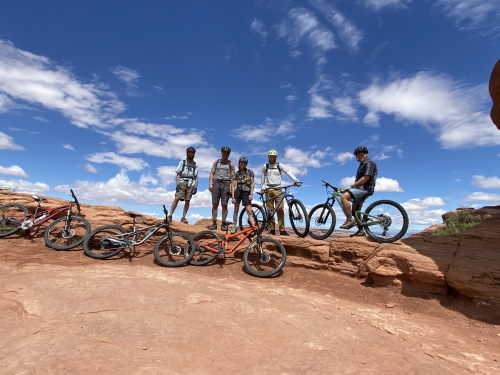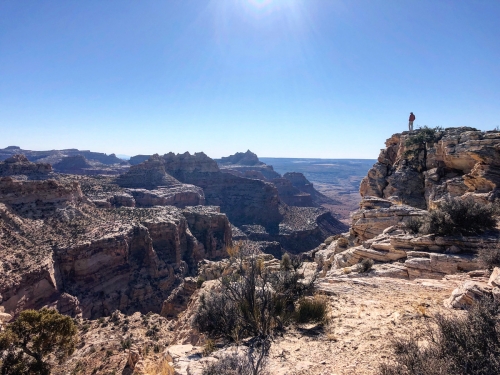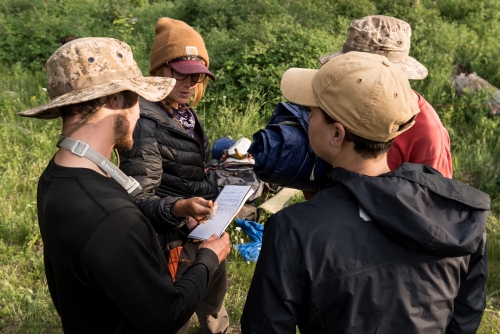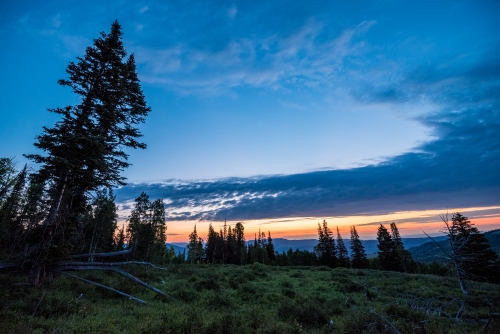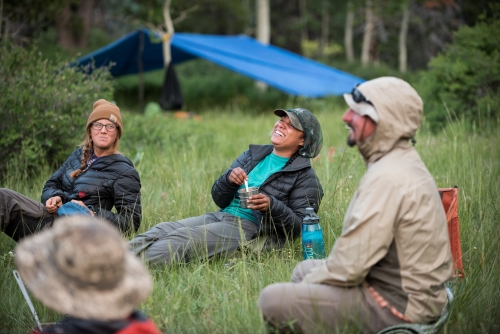Blog
May 25, 2021
Meet our Adventure Programming Team
Our Adventure Programming (AP) Department is led by Madison Brandt with an outstanding team of instructors. Here they are in their own words. Madison Brandt, AP Director Hello! My name is Madison: I use she/her pronouns. I am currently the Adventure Program Director serving students and clients in both Elements Wilderness and Elements Traverse programs. As director of the adventure program, I have the amazing opportunity to bring adventure, challenge, and creative insight to clients/students in the field through unique experiences like climbing, rappelling, fly fishing, mountain biking, leather working, art, and more. I grew up in northern New Mexico exploring canyons with my dogs and building forts in pinyon pine trees - snake bite kit and radio to communicate with mom in hand. I obtained my undergraduate degree at Colorado State University and went on to work in the fields of wilderness therapy, therapy, outdoor science education, and outdoor…
January 14, 2021
Descending the Canyon
From the desk of Madison Brandt, Adventure Programming Director, Elements Traverse The day started out with hiking to the wide mouth of the canyon, a deep tendril of a larger canyon system within the Northern San Rafael Swell. The view point provided an expansive look into desert country: tan and rust colored canyon walls leading down to a valley floor dotted with juniper and sage. Clients found their individual spots to sit, looking out at the varying shades of blue of distant desert vistas in the early morning light. The Adventure Programming (AP) instructor led clients through a mindfulness meditation: breathing in the vastness of the canyon landscape and breathing out the vastness of their internal landscape. The clients of this group were working through deep personal trauma. Sometimes they struggled with connecting to their physical bodily needs as well as the ways in which strong emotion expresses itself within…
November 28, 2017
No Unilateral Decisions!
From the desk of Andrew Powell, CEO of Elements Traverse The great paradox of psychological and behavioral health is that there is no standard formula for helping a struggling individual or family achieve success. If there were one single key to health and success, the treatment process would be over in mere days and we could happily say our services are no longer necessary. So what are we left with then? Informed subjectivity. Educated and experienced professionals at every stage: intervention, treatment, assessment, and future planning. Key individuals at each step who have a common focus: our client and his or her family. But there’s more to it than having a large and diverse wilderness treatment team. As our team knows well, one of my mantras is “no unilateral decisions!” In this highly complex dynamic, where there are more treatment options than one could count, we need all hands on deck. The more eyes we get…
October 04, 2017
The Opposite of Scale
From the desk of Andrew Powell, CEO of Elements Traverse As a boots-on-the-ground lover of the outdoors, a believer in wilderness therapy, and a student of experiential education, my choice to pursue an MBA must have seemed strange to those who know me. What they didn’t know was that I was on a personal and professional quest to turn a therapy-driven field into a professional outfit that matches and exceeds the efficiency and efficacy of any hospital. Although I learned many concepts and ideas that apply directly to what I do today, there are a few business concepts that hold no water in our field. None so much as the concept of scale. Scale, and its more broad term, “economy of scale” refers to the concept that the larger an organization, the more efficient, cost-effective, and profitable it becomes. Of course it’s not too hard to understand that after all…
September 25, 2017
Field Staff as Counselors: Wilderness Therapy 7 Days a Week
From the desk of Andrew Powell, CEO of Elements Traverse As I reflect on my years on the trail as a Wilderness Therapy Field Instructor, I marvel at how little I knew of therapy relative to the knowledge I acquired in the ten years since then. One thing I have learned is that although recruiting, vetting, pre-service training, in-service training, and on-the-job training are critical, it is not the quantity but the tone and content of that training that makes all the difference in the instructors' performance.What decides the content? What decides the tone? I believe it is how we see our wilderness therapy staff that makes all the difference. If we see our direct care team as babysitters, we will train and guide them to merely "contain" our clients. And they will be great babysitters. If we see our team as outdoors people, we will spend the bulk of…


